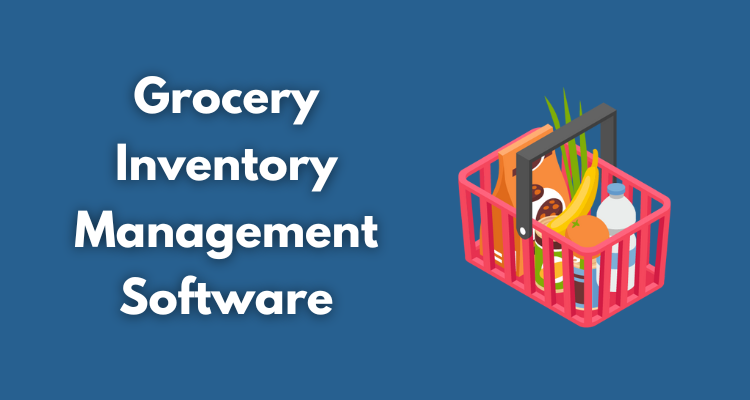As reported by Deloitte in 2024, over 80% of grocery retailers recognized technology upgrades as critical to survival and growth. Grocery inventory management software is no longer an exclusive advantage for supermarket giants—it’s reshaping the operations of local markets, independent grocers, and specialty food retailers.
In a landscape where efficiency, agility, and customer experience define success, having the proper inventory management tools is essential. Let’s look at how intelligent grocery inventory systems are giving retailers of all sizes the flexibility and control they need to thrive.
Table of Contents
ToggleSmarter Tools for a Changing Retail Environment

The grocery retail landscape has undergone a profound transformation, driven by the need for efficiency, adaptability, and customer-centric operations. Once exclusive to the largest supermarket chains, technology, specifically, grocery inventory management software, now empowers retailers of every size to reimagine how they operate.
At the heart of this shift lies a unifying idea: operational intelligence. Modern software enables grocery businesses to not only react to challenges but also anticipate, plan, and grow proactively. It ties together inventory control, customer engagement, compliance, checkout speed, scalability, and digital integration into one cohesive strategy.
Lightening the Load for Small Teams
Independent store owners often wear many hats, managing purchasing, stocking, customer service, and bookkeeping all within a single day. Grocery inventory management software automates much of this workload—handling stock levels, order scheduling, supplier communications, and price updates with minimal oversight.
Instead of switching between spreadsheets, handwritten notes, and disconnected point-of-sale (POS) systems, store managers can monitor everything from a single, intuitive platform. This means they can spot trends, track sales, manage promotions, and keep tabs on suppliers without missing a beat. The resulting time savings allow small teams to invest more energy in personalizing customer service and expanding business opportunities, such as launching loyalty programs or community events.
Smarter Inventory Control
Product shortages, overstocks, and spoilage eat into profits and frustrate customers. Modern grocery software changes the game with real-time tracking, alerts, and intelligent forecasting based on actual sales data and seasonal patterns.
Real-time inventory reporting, enhanced by AI platforms like LEAFIO.AI, revolutionizes retail. Instead of relying on infrequent checks, stores receive up-to-the-minute data highlighting potential problems. AI analyzes customer buying trends and store-specific variables to provide precise forecasts, optimizing stock levels, reducing costs, and streamlining operations. This proactive approach ensures accurate predictions, minimizing lost sales and overstock situations.
This precision helps retailers fine-tune stock levels, refresh product lines as needed, and avoid costly mistakes. Intelligent inventory management leads to fresher shelves, more satisfied shoppers, and less waste, ultimately driving profitability and strengthening the brand’s reputation for reliability.
Speedier Checkout Experiences
A slow checkout process is a surefire way to lose a customer’s goodwill. Today’s inventory management systems integrate advanced POS technology that supports digital wallets, loyalty rewards, real-time inventory visibility, and instant digital receipts.
These upgrades allow small retailers to deliver an experience on par with major competitors—fast, smooth, and secure. Customers no longer have to fumble with cash or wait while an associate manually checks the stock. New features like scan-and-go or mobile checkout options empower shoppers to move through the store quickly and easily.
Moreover, checkout improvements benefit employees by reducing manual errors and stress during peak hours. Fewer checkout bottlenecks mean happier customers and a more relaxed, efficient staff.
Unlocking Customer Insights
Modern retail demands data-driven decisions. Innovative grocery inventory software automatically collects and organizes customer data, helping stores understand buying patterns, predict demand, and create targeted marketing campaigns.
Instead of relying on gut feeling or anecdotal evidence, retailers can access detailed analytics that show which products drive repeat visits, what promotions are most effective, and when customers are most likely to shop.
Retailers can then offer tailored promotions, build more attractive product assortments, and design store layouts that reflect actual shopping habits. This level of personalization strengthens loyalty, boosts basket size, and creates a more engaging shopping experience that keeps customers coming back.
Simplifying Compliance and Product Labeling
Regulatory compliance isn’t just a burden for large chains. Local grocers must also meet evolving standards for food labeling, allergen information, nutritional information, and even sustainability practices.
Current inventory solutions come with built-in compliance tools that automatically flag potential issues, generate accurate shelf tags and packaging labels, and ensure that all product information remains up to date with local and federal regulations-a process that can be further supported through sustainable packaging resources like those offered by Arka.
By automating these critical tasks, grocery inventory management software helps prevent costly mistakes, legal troubles, and damage to a store’s reputation. Plus, transparent and compliant labeling builds trust with health-conscious and detail-oriented shoppers, making it easier for smaller retailers to compete with national brands.
Affordable, Modular, and Scalable
High-end grocery technology was once prohibitively expensive for smaller players. Not anymore. Today’s inventory software solutions offer modular pricing and feature sets, letting businesses scale their investments as they grow.
Retailers can start with basics like stock control, POS integration, and sales reporting, then add advanced features such as multi-location inventory management, loyalty programs, automated marketing, or predictive analytics as they expand.
Flexible monthly subscriptions and cloud-based deployments mean there’s no need for costly servers or dedicated IT teams. This “pay-as-you-grow” model puts transformative tools within reach for family-run stores, startups, and niche grocers alike.
Bridging Physical Stores and Online Sales
Omnichannel retailing is no longer optional; it’s the expectation. Customers want the flexibility to shop online, schedule curbside pickups, or request home deliveries seamlessly.
Modern grocery inventory management software ensures a smooth integration between in-store and online systems, syncing product availability, pricing, promotions, and customer loyalty programs across all channels.
This unified approach reduces inventory discrepancies, prevents overselling, and enables retailers to launch and manage online storefronts without hiring separate teams. A local grocery store can now compete with digital giants on convenience and personalization, building stronger, more resilient customer relationships.
Conclusion
Technology has increasingly emerged as a powerful equalizer in the grocery retail sector, significantly transforming the way businesses operate. In today’s fast-paced and highly competitive market, grocery inventory management software offers a range of sophisticated tools that were once only available to larger corporations.
Now, these advanced solutions are accessible to businesses of all sizes, from small family-owned shops to larger supermarket chains. This accessibility empowers retailers to optimize their operations more effectively, enabling them to serve their customers better and adapt swiftly to evolving market demands and unexpected challenges.









